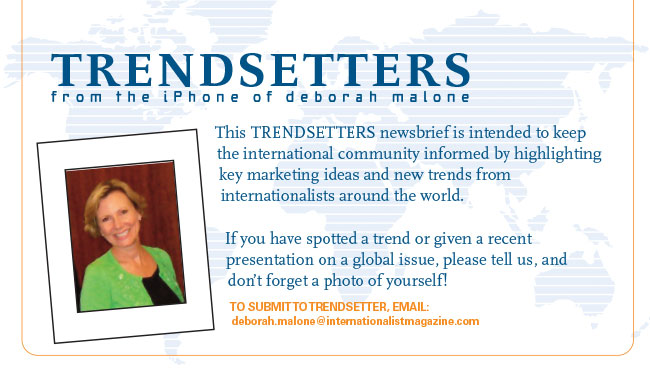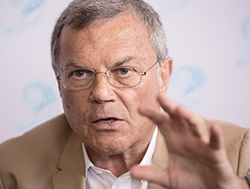

Martin Sorrell
Trendsetters: Sir Martin Sorrell Shares his Thoughts on a Changing Industry
Sir Martin Sorrell was omnipresent at the marathon Cannes Lions Festival this year, and very much in his element. His week-long schedule included a live recording of BBC's HARDtalk, the current affairs program with journalist Stephen Sackur, a keynote discussion at the Palais des Festivals with former US Vice President Al Gore and attendance at the final Lions Awards Ceremony on Saturday night, along with countless sessions with WPP agencies and clients, during which he spoke plainly on topics ranging from the rise of content to the significance of today's media agency reviews to the role of women in the industry.
Sorrell's extraordinarily deep understanding of both broad industry issues and the granular specifics that drive them is always impressive. I was able to attend a few of his sessions, and -- beyond the obvious headlines -- I found his thoughts on trust, talent and client-agency relationships particularly significant and timely.
With respect to the first, Sorrell holds firmly to the fundamental importance of trust in an era in which the average tenure of a client-agency relationship has decreased from seven years to two or three. He jokes that -- while the backdrop may have changed from the bar and golf course (a la Mad Men) -- the significance of forging such a bond remains as critical as ever.
He views the key reasons for this summer's "mediapalooza" of global pitches to be either the natural maturation of a contract, business consolidation resulting from client acquisitions or a need to simplify/consolidate agency ecosystems. He adds that current cost pressure on marketers is intense, particularly in a world where significant growth is hard to come by and procurement departments are more involved in marketing management. "There's a premium on effectiveness now--both in terms of better work and more efficiency," he remarks, while emphasizing the need for a focus on continuous improvement. "How do we work together to provide the best for our clients? We have to keep moving despite the pressures of the business."
He further offers that an agency, particularly one with global reach, can be an efficient integrating mechanism for a client willing to share scope and control. "We have 188,000 people in 111 countries, why not let us provide global integration?"
Martin Sorrell also admits that he obsesses about getting and keeping top talent, saying, "If you want good people, you can't clip their wings continually. The better the people, the harder it is to work with them . . . and good people don't inherently want to play together. Fortunately, good people are right more often than they are wrong, but they definitely have a point of view. Managing them is difficult, but they are a significant asset."
There were, of course, questions regarding Martin Sorrell's current compensation package, which he was more than willing to address. "I am an owner, and I behave like one. Entrepreneurism is about risk-taking, not autonomy; you have to put your money where your mouth is. I invested in this company with my own funds from the beginning. I've been at this for 30 years, during which time growth has been strong. I am focused on building this company and continually investing in it."
When asked to describe the qualities of a leader, Sir Martin Sorrell had an immediate, single-word answer: commitment. "I believe the greatest attribute of a leader is commitment. Certainly, you can screw up our business, but it's not brain surgery. What differentiates the people inside our companies is commitment."
When asked if the industry is heading toward a time when it may not need people (given predictions that 50% of digital media buying will ultimately be programmatically-driven), Sorrell was clear: "We will always need people. The question is, what kind of people? And we'll undoubtedly be competing for them."
He suggested that we'll see the biggest changes in our business in the next ten years due to emerging markets, new forms of media and the rise of data. With regard to geography, Martin Sorrell admits to being "equally excited" about Africa, Latin America and Asia, adding that Africa is often forgotten in the growth mix, despite its fragmentation and economic challenges.
Ultimately, he notes that technology will drive most change, while data and content is creating a business that Don Draper wouldn't recognize. These three differentiators -- technology, data and content -- are why WPP is investing in companies like AppNexus, comScore and Vice, and participating in new start-ups such as Truffle Pig, which was announced during the Festival.
EXECUTIVE SNAPSHOT
Sir Martin Sorrell founded WPP, the world's leading communications services group, in 1985.
Collectively, WPP employs 188,000 people in over 3,000 offices in 111 countries. The group's worldwide companies include JWT, Ogilvy & Mather Advertising, Y&R, Grey, Mindshare, MEC, MediaCom, Maxus, Kantar (including Millward Brown and TNS), Wunderman, Burson-Marsteller, Hill+Knowlton Strategies, Landor, Brand Union, Fitch, The Partners, AKQA and WPP Digital. Clients include 351 of the Fortune Global 500, all 30 of the Dow Jones 30, 69 of the NASDAQ 100 and 31 of the Fortune e-50.
Martin Sorrell actively supports the advancement of international business schools, advising Harvard, IESE, the Indian School of Business and the China Europe International Business School. He has been publicly recognized with a number of awards, including the Harvard Business School Alumni Achievement Award, and received a knighthood in January 2000.

